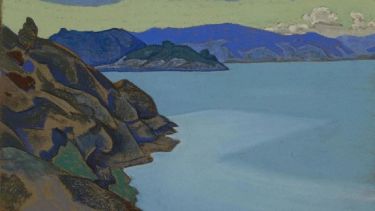Russian Translation Competition 2022
We are delighted to announce the second University of Sheffield Russian Translation Competition for Year 12 and Year 13 students in the UK.

This competition is now closed. For any queries, please contact translation-competition@sheffield.ac.uk
2022 Winners
Congratulations to the 10 winners of our Russian Translation Competition! They are (in alphabetical order):
- Danial Aspandiiarov, Harrow School
- Alex Feeney, City of London School
- Isaac Halamish, City of London School
- Maxim Hornby, Calday Grange Grammar School
- Gracie Joyce, Redmaids High School
- Barnaby Keogh, Bolton School Boys' Division
- Ben Rimmer, Bolton School Boys’ Division
- Alisa Rybalkina, St. Olave's Grammar school
- Alia Samad, Cranford Community College
- Tamir Zolboo, Harrow School
We received a very high number of entries for the competition and very much enjoyed reading them! As ever, the overall standard was impressively high. Many thanks to all of you who entered the competition.
Unfortunately, we cannot provide feedback on individual entries.
Text
Extract from Aleksei Polyarinov, Rif (Moscow: Inspiria, 2022)
Polyarinov’s novel Rif has been shortlisted for the NOS (Novaya slovesnost’) prize. The author’s blog can be found here. You can watch an interview with Polyarinov in which he speaks about Rif here.
- Original Text
-
Кира еще раз перечитала имена и огляделась, окинула взглядом площадь. Она сотни, тысячи раз ходила здесь, возможно, даже наступала на эту табличку, но ей и в голову не приходило, что тут есть табличка с именами. Впрочем, неудивительно, подумала она, ее как будто специально вбили в брусчатку именно здесь, на краю, — чтобы спрятать. Площадь уже давно была «захвачена» другим монументом — «голым мужиком», установленным в самом центре, — и всей своей кричащей, вызывающей обнаженностью он умножал невидимость окружающих объектов. Кроме него на общем фоне блеклых типовых пятиэтажек выделялось разве что здание администрации — в его фасаде чувствовался замысел, прикосновение архитектора, хотя Кира и не смогла бы сказать, что это за стиль.
Она еще раз перечитала имена на табличке. Титов молча стоял в стороне, сунув руки в карманы.
— В школе нас водили сюда на экскурсию, но я совершенно не помню эту табличку. — Она помолчала, обернулась на Титова. — Олег Иванович называет вас «безрассудным молодым человеком».
— Не очень-то молодой. Мне почти сорок.
— Вы не знаете Олега Ивановича. Для него все, у кого на голове есть волосы, — молодые.
Он улыбнулся.
[…]
— Что вы хотите найти? — спросила Кира. — Ну, в архивах?
Он убрал блокнот и карандаш в нагрудный карман, застегнул молнию.
— Я думал, вы все обо мне узнали, как только я проехал стелу на въезде. — Она серьезно посмотрела на него, и он, вздохнув, показал на табличку в брусчатке. — Я здесь из-за них. Хочу знать, кто они. И написать их историю. Уже неделю тут околачиваюсь и заметил одну закономерность: единственное, что местные знают про бунт 62 года, — это то, что он был. Больше ничего. Вот вы, например? Можете что-нибудь рассказать?
(260 words)
- Translation
-
Kira read through the names once again and, looking around, took in the square. She had been here hundreds, thousands of times and might even have stepped on this plaque, but it had never occurred to her that there was a plaque with names on it. Anyway, it was hardly surprising, she thought, it seemed to have been deliberately set into the paving stones right here, on the edge of the square, to hide it.
The square had been swallowed up long ago by another monument – ‘the naked peasant’, which had been put right in the middle – and its screaming, provocative nakedness had made all the surrounding buildings seem all the more invisible.
Apart from it, perhaps only the local government building stood out from the faded, standard five-storey blocks of flats – in its façade some thinking or touch of an architect could be detected, although Kira would not have been able to say what sort of style it was.
She read through the names on the plaque once again. Titov stood to one side with his hands in his pockets, not saying anything.
‘We were brought here on a school trip, but I don’t remember this plaque at all.’ She was silent for a moment, then turned to Titov. ‘Oleg Ivanovich calls you “an irresponsible young man.”’
‘I’m not that young. I’m almost forty.’
‘You don’t know Oleg Ivanovich. To him, anyone with hair on their head is young.’
He smiled.
[…]
‘What do you want to find?’ Kira asked. ‘I mean, in the archives?’
He put his notebook and pencil away in his breast pocket and zipped it up.
‘I thought you all knew all about me the minute I passed the monument on the way into town.’ She gave him a serious look; he sighed and pointed at the plaque in the cobblestones. ‘I’m here because of them. I want to know who they were. And to write their history. I’ve been knocking around here for a week and have noticed a trend: the only thing people here know about the rebellion of ’62 is that it happened. And that’s it. Take you, for instance. Can you say anything about it?
The prize
The winners received a prize of a £25 Amazon voucher and an invitation to take part in a special Translation Workshop organized by the School of Languages and Cultures at the University of Sheffield, involving Russian academics, Masters students in Translation Studies and alumni who work in translation-related fields. The Workshop was held on Wednesday 7th December 2022.
The judges
The translations were read and judged by a panel of Russian experts from the School of Languages and Cultures at the University of Sheffield.
About the competition
The competition runs annually and is open to students of Russian in Years 12 and 13 in the UK. Entrants must translate into English an original Russian text that has not previously been published in English. Translations must be the original work of individual students, and submitted via an online entry form.

Visit us
Discover what sets Sheffield apart at our undergraduate open days on Saturday 21 June and Saturday 5 July 2025.
